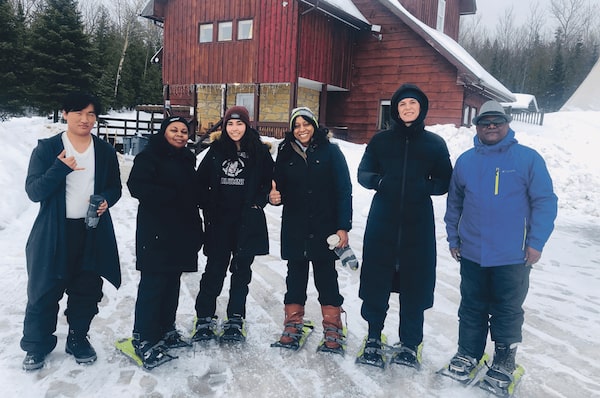
Centennial students travelling to Gwekwaadziwin Miikan, located on Manitoulin Island, can shadow staff at the program that delivers land-based treatment for young adults struggling with addiction and mental health issues.Supplied
When the Truth and Reconciliation Commission issued its calls to action in 2015, it made education a central part of the reconciliation process. As educational institutions across the country are mustering their response, it is critical that they see Indigenous communities as equitable partners and listen to their needs, stresses Cheryl McPherson, who is Indigenous and a professor and co-ordinator at Centennial College’s addiction and mental health (AMH) worker program in Toronto.
“When we set out to rebuild relationships with Indigenous communities, we have to hear what the communities want rather than telling them what we think they need,” she says. “We can only make these relationships sustainable and long-term if they are based on mutual respect.”
A partnership responding to community needs started with a connection between Centennial’s AMH program and Gwekwaadziwin Miikan Youth Mental Health and Addiction Treatment Program (gwek.ca), an organization under the umbrella of United Chiefs and Councils of Mnidoo Mnising and local and provincial resources, says Ms. McPherson. “We were excited about collaborating with a community organization and providing our students with opportunities to learn about land-based healing.”
Centennial students travelling to Gwekwaadziwin Miikan, located on the Aundeck Omni Kaning First Nation on Manitoulin Island, can shadow staff at the program that supports young adults between the ages of 19 and 30 struggling with addiction and mental health issues. In addition to being exposed to Indigenous knowledge, the students live on the land in prospector tents where, at times, temperatures dip to minus 30 degrees Celsius.
“They also pitch in to assist in facilitating daily circles, cutting firewood and other chores that are necessary to run a land-based camp that are a means of survival, but also increase self-esteem and foster resiliency,” says Ms. McPherson. “They come back feeling connected to the land, the participants and staff, the culture and the teachings. They also feel more connected to themselves.”
Whether it’s for mental health or substance use issues, we need programs that address identity and culture to deal with the devastating challenges stemming from a colonial history in Canada.
— Cheryl McPherson, professor and co-ordinator at Centennial College’s addiction and mental health (AMH) worker program in Toronto
These transformative outcomes inspired an expansion of the partnership and the co-development of a webinar, designed to help students in the college’s AMH and social service work programs gain valuable knowledge and skills related to land-based counselling and Indigenous therapeutic practices.
Ms. McPherson, who has been a social worker in the Indigenous community for the past 20 years, knows from personal experience that “culturally safe treatments are urgently needed,” she says. Compared to the general population, Indigenous people are six times more likely to suffer alcohol-related deaths and more than three times more likely to suffer drug-induced deaths.
“Whether it’s for mental health or substance use issues, we need programs that address identity and culture to deal with the devastating challenges stemming from a colonial history in Canada,” says Ms. McPherson.
Due to Gwekwaadziwin Miikan’s unique approach, it has become a destination for youth and young adults from across Ontario, including the GTA, she says. “From sitting with the participants and hearing their stories, I know they really value having access to a culturally appropriate program that resonates with them.”
Ms. McPherson hopes the model’s success can inspire more attention on land-based healing and broader collaborations with Indigenous communities to advance reconciliation while – at the same time – offering hope for people struggling with mental health and substance use challenges.
INTERNSHIPS.
Indigenous software testers

A booming IT sector equals employment opportunities, and it is Keith McIntosh’s goal to turn Canada’s technology talent shortage into meaningful training and employment for Indigenous people.
“The Truth and Reconciliation Commission’s calls to action emphasize the importance of providing Indigenous people with opportunities to participate in the economy. We can do this by enabling them to join the IT community,” says Mr. McIntosh, CEO of Professional Quality Assurance Ltd. and founder of PLATO Testing.
PLATO Testing is working to develop and leverage a network of Indigenous software testers with a focus on projects that would otherwise be sent offshore. A lack of experience or sector connections can prevent people from entering the workforce, and Mr. McIntosh believes internships can provide an answer. Internship opportunities at PLATO Testing have been supported through the Career-Launcher Internships from Colleges and Institutes Canada, which are funded by the Government of Canada as part of the Youth Employment and Skills Strategy.
Collaborations with educational partners and CICan are helping to enhance PLATO Testing’s impact, he says. “Our goal is to create 1,000 jobs across Canada. More support and partnerships will make this easier to achieve.”
Produced by Randall Anthony Communications. The Globe’s Editorial Department was not involved in its creation.